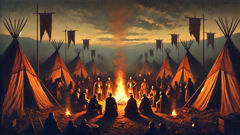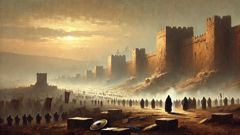Introduction
The plain around Thebes holds a memory like an ache: a long, flat ribbon of earth where wheat once swayed and now the earth remembers the tread of armor and the shadow of spears. This story begins not with a single moment of violence but with a wound that never fully closed, a household poisoned by a secret and a curse. Oedipus, in all versions spoken and unsaid, brought ruin upon his house—though not merely by misdeed but by destiny braided into his name. When his sons grew to manhood, they took up the heritage of their father's sorrow; they were twin flames hardened into knives. Eteocles claimed the throne of Thebes and held it tightly as if sharing were itself an outrage. Polynices, cast out and counting the small mercies of exile, returned with allies bound by oath and ambition. Between them lay more than a throne: a question of honor and the shape of justice. Around that question gathered the seven champions—men whose faces would be carved into song and whose choices would hammer the city into ruin. The tale that follows is not a simple ledger of deeds. It is a story of voices in the night—prophecies shouted beneath the wind, mothers who clasped sons with the certainty that they would not see them again, and warriors who marched beneath flags like funerals, believing in glory or bluffing their way into fate. There are no villains here in the cartoon sense, only people driven by loyalty, fear, pride, and promise. My purpose is to tell this Greek tragedy as a human story: to walk the gate of Thebes at dawn, to stand where the seven set their feet, to hear the complaints of wives and the last prayers of men. I will give you the aspirational words carved into bronze and the small, private confessions whispered on straw. You will see Polynices' shadow cross the river and Eteocles' banner flare over the city walls. You will meet the champions—men of different origins and motives—who, loyally or begrudgingly, answered the summons. And beneath all of this, like water wearing a valley into rock, the notion of a curse, of blood that remembers itself across generations, will appear again and again. The story flows between public act and private ruin, and though it belongs to the Theban tradition, it is also an old story about any place where kin become enemies and where cities are punished by the quarrels of their children. What follows is detailed and deliberate; it aims to be truthful to the mood of the myth while remaining original, painting the tragedy in the tones and textures of ordinary human life.
From the House of Oedipus to the Edge of Exile
The story of the Seven Against Thebes is braided with misfortune from its first breath. Oedipus, king once glorious and then disgraced, carried the stain of oracle and action alike. His sons, Eteocles and Polynices, were reared in the same palace and in the same shadow: taught by the same tutors, trained on the same yards where bronze clashed and shone, and yet taught divergent lessons in loyalty. When the time came to divide power, what might have been a simple arrangement—shared rule, alternating years—became a test of character. Eteocles, who first held the scepter, refused to yield to the pact that, on paper, promised alternation. The reasons he offered were many: fear of another who might reverse his work, a belief in their father's counsel whispered in half-remembered phrases, or simply the corrosive hunger that wealth and power often bring. Polynices, humiliated and betrayed, was driven by a different fire: wounded pride, the need to reclaim honor in the eyes of his exiles, and a bitter certainty that a brother's refusal must be confronted.

Exile transforms men. Polynices left the city with only a handful of followers and the hard lessons of solitude. He spent seasons in foreign courts, selling his story to princes, bargaining promises and men for a chance—any chance—to strike back. His wanderings were not only practical but elegiac: each country he touched taught him the variable faces of hospitality and disdain. Some hosts received him as a cause, some as a convenient ally, and some as a nuisance whose ambitions might be useful at a price. There he met men whose grudges and dreams radiated like sparks; warlords who loved neither Thebes nor the house of Oedipus but loved the chance to test their mettle and increase their names. Among these, Polynices found the seeds of the Seven—a coalition not born from friendship but from converging motives. The leaders who swore to his cause represented the complicated politics of the Greek world. They were not a simple assembly of brothers in arms; they were a cross-section of men who saw in the Theban city a strategic prize, a place to raise a banner and seal a reputation.
The seven who finally marched on Thebes were emblematic: they carried differing claims and temperaments, and through them the story gathered texture. Adrastus, king of Argos, lent the most persuasive presence; he was older, already weathered by campaigns, and bound by a sense of hospitality to take in the exile. His participation was heavy with oath—vows in bronze and salt, between men who pledged their lives as easily as cups of wine. There were others: warriors who thirsted for renown and owed debts of honor, like Tydeus, fierce and blunt; Capaneus, who walked with blasphemous pride; Hippomedon, bulky and unshakable; Amphiaraus, who brought prophecy and reluctance to the cohort; Parthenopaeus, young and quick; and Polynices himself, hunger and regret braided into his gaze. Each of these men carried his own logic for joining the march to Thebes: some because of loyalty to an oath, others for pride or the desire for glory, others because there was no refuge left to them but the path of steel.
The city of Thebes, meanwhile, braced for doom in its own ways. Eteocles, who had seized the crown, organized the defense with a ruler's grim efficiency: he placed his men along the walls, assigned each of the seven a gate to storm, and prepared to meet each leader with a champion born of Theban blood. The sense of inevitability—of a siege already written in the bones of the land—pervaded every action. Mothers covered their children’s ears when the trumpet sounded; old men shook their heads over the ruts of the streets; merchants shuttered their stalls as if sealing their lives away for a time they did not expect to return. Prophecy roared in the background: some, like Amphiaraus, foresaw doom and wanted no part in the attack; others dared the gods and boasted of victory. The chorus of warning voices did little to stop the drumbeat of marching feet.
What made this strife uniquely tragic was not the number of warriors or the strategy of siegecraft but that the prime actors were bound by blood and oaths. Brothers, separated by betrayal, walked on paths that would cross in blood. Men who once shared wine and stories now measured one another across the distance of a battlefield. The moral complexities of honor versus oath versus kinship turned every decision into a small calamity. Polynices could have chosen neutrality, exile’s slow comforts, or reconciliation; Eteocles could have abided by the pact; but human beings, with their stubborn loves and their unextinguished needs, often choose action that makes sense in a small moral chamber rather than a wider one. And thus they marched—Polynices with vows to correct a wrong, Eteocles with the stubborn belief that he was preserving the city's order.
On the eve of the assault, the air around Thebes felt thick and remembered. Campfires speckled the plain like distant stars; men cleaned their armor and sharpened spears with a kind of intimate ceremony; the young spoke loudly of glory while the old told each other the names of the dead and the vanished. In the city, the gates stood like the jaws of an animal waiting to close. The brothers, each in his place, had moments of private pain—last letters written by trembling hands, wives who could not sleep and who watched the dawn like an accusation. It is always the hours before the blood flows that carry the deepest malaise: they are the hours when memory and future meet and when fate seems to lean down to listen to human talk. For Thebes, the night before the seven attacked was that hour. The city did not yet know that its sons would be cut down; the plain did not yet know that the banner of Argos would fall, or that those who carried it would die. It only knew that something ancient and unkind had been stirred again, and that history, like a hungry animal, would be fed.
Siege, Sacrifice, and the Silence of Theban Gates
The dawn that brought the seven to Thebes was a rotten and tender thing—rotten because it came with the stink of blood and iron, tender because those who would perish still showed love in small gestures: a clasped hand, a letter folded against the heart, a song hummed to steady a shaken voice. Each of the seven approached a gate; each gate meant a duel, and each duel unfolded like a private drama, refracted from the larger catastrophe of the siege.

Capaneus, proud as a god of his own making, strode to the gates with thunder in his steps. He mocked the walls and the gods openly, spitting words that were like hot stones. Pride in Greek tragedy is no abstract flourish but a material thing that makes men act as if they were divinity. Capaneus' arrogance was his undoing: as his assault reached its climax, and the ladders creaked against the battlements, the sky itself answered his blasphemy. A thunderbolt, hurled like a judgment, felled him in flame and sent his armor rolling like a child's toy. In the city, watchers cried out as oak and men caught fire together. His end was spectacular and final: he had challenged the heavens and been answered. The story of Capaneus remains a cautionary mirror: pride that forgets limits invites a catastrophic reply.
Tydeus, known for a savage streak, fought with a fury that was almost animal. He met the Theban champion in a duel that tasted of immediate and brutal necessity. Tydeus was not a man to compose sonnets before battle; he was a man who felt life as a series of consumable moments—win, eat, sleep, fight. His combat was feral, and even in the myths, his hands were stained with the evidence of rage. In one telling, after being wounded and in a rage, he performed an act that horrified everyone who witnessed it, a gesture so barbarous that even the gods turned away. The consequences of such ferocity are both moral and strategic: terror can win a fight, but it also breaks the bonds of civil code and breeds a world where none of the old restraints remain.
Amphiaraus, in contrast, was a man cursed to see the truth. A prophet among warriors, he recognized the path to ruin and warned against it. Yet vows and honor compelled him to join the march. He walked toward his doom with the clear-eyed resignation of someone who had already mapped the contours of loss. When the assault closed and the earth moved under Mount Cithaeron, Amphiaraus' chariot sank into the ground, a sign that even the land would not release him from fate. His exit was not cinematic in the way Capaneus' fall had been; it was quieter, the earth swallowing an old man whose sight had been too clear for the comfort of his contemporaries. The variety of deaths among the seven—some loud and blasphemous, some grim and prophetic—gives shape to the tragic theme: no man escapes the verdict of destiny, whether by pride, hunger, or the clarity that reveals truth.
Behind these men, the city was a place of taut nerves. Eteocles, who had held the scepter and believed in his duties as ruler, met each of the attackers with the personal urgency of a man defending his family and the city that had raised him. His clashes with Polynices were the heart of the siege in every telling: two brothers, changes of fortune, faces now turned toward the other as if recognition could settle what law would not. Their final meeting was not simply the collision of two trained warriors but a domestic tragedy writ huge: they fought with a ferocity born of betrayal and the heavy, bitter love that exists between those who once shared a bed and a childhood. When they struck each other down, they ended not only a fight for power but a lineage of possibility. The city did not witness a triumphant reclaiming; it watched two sons die to a pride that had swelled like a tumor and finally consumed them both.
When the true cost is tallied, Thebes becomes a hollowed place. The seven champions are dead or routed; the walls still stand, perhaps, but the city's soul is wounded. Mothers wail in the square; the secret bonds of households are rent. The gods, who might have been petitioned and would have answered in various ways, are itself a mixed chorus: some sternly silent, some jealous, some moved to pity. The funeral rites that follow attempt to stitch grief into a pattern, to name and bury and make meaning out of what remains. Yet the mourning also reveals uglier impulses: in the wake of violence, justice and revenge contort into mutual accusations. The house of Oedipus, as always, bears the brunt. Polynices, though his bones lie under sky, returns as a specter in the city's memory: rumors soften into curses whispered to children on stormy nights. Eteocles is remembered equally, not for a triumph but for a final act of defiance that cost him his life.
There is a particular cruelty to the aftermath because the ruin is not remote; it is intimate. Thebes does not fall into total ruin in the same way as some cities in myth, but its social fabric tears. The brothers' deaths bring an end to a line and inaugurate a new kind of rule—if any rule can be called that—built on fear and the endless replaying of grievances. The names of the dead are carved onto altars, but no memorial can replace the living housewife who will never again set a plate by the fire for her husband. The poets who later sing the tale will emphasize the grandeur and the moral lessons: hubris punished, the necessity of piety, the cost of broken oaths. But those moral lessons are not simple; they are messy and intertwined. The chorus of mourning and the legal disputes that follow the siege show how deeply embedded moral logic and pragmatic politics can be. Funerary rites, the settling of the dead, and the ways a city reconstructs order are all as much a part of the tragedy as any battlefield scene.
The exile’s return, the champions’ march, and the walls’ meeting with spears compose a tragedy that refuses easy closure. It asks, again and again, what a city must sacrifice to preserve itself, and whether such sacrifice is ever worth the roofs and altars it aims to secure. In the end, the tale of the Seven Against Thebes is a tapestry of human motives—shame and pride, love and violence, vow and prophecy. Each thread pulls taut and frays in different ways, and the pattern that remains is one of ruin and remembrance. Those who sing of the siege do so with the knowledge that glory and mourning are two faces of the same coin, and that in the heavy light of hindsight, the silence that follows a massacre is as instructive as the trumpets that preceded it. The bones of the men lie beneath the plain, their names passing into story. The city continues, because cities do, but it carries a scar that will mark generations to come.
Conclusion
When the dust settles and the trumpet's echo no longer trembles in the stones, what remains is the quieter work of living with loss. The Theban tale did not end with a single moral sentence; instead it offers a chorus of small consequences: family lines broken, gardens untended, oaths whispered into graves. In the long view, what the story teaches is not a list of do's and don'ts but the deep cost of choosing one good over another—of selecting loyalty to an oath over peace with kin, of choosing pride when humility might have saved sons. The tale of the Seven Against Thebes has endured because it is, in essence, a mirror. It shows how communities fracture when personal ambition and public duty collide, and how even the best-laid plans are vulnerable to the caprices of fate and human error. The tale's music is sorrowful and precise: headings of hubris, chorus of grief, and the mute harmony of ruins. In telling it now, centuries from those fires and spears, we can still feel the pull—the ache for recognition, the sting of betrayal, and the small consolations that families find when they try to rebuild. The city, like any city caught in the crossfire of its children's quarrels, teaches us the same lesson anew: that power always has a price, and that the ledger of history is written in the names of those who loved and fought and did not live to write their own accounts. The scar on Thebes becomes a story told around dinner tables and at altars, a warning and a lament, because myth's power is to pass a human truth down across time. In remembering the seven, we do not glorify war; we try to reckon with its consequences. We honor the grief, weigh the motives, and finally, through memory, refuse to let the dead be only statistics. They return to us as warnings, as teachers, as the quiet insistence that we remember—and, perhaps, do somewhat better than they did.













